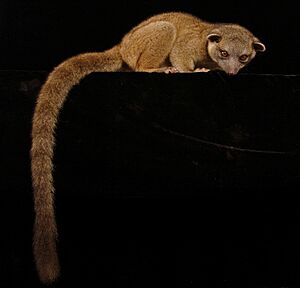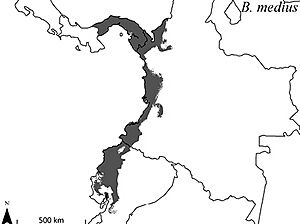Western lowland olingo facts for kids
Quick facts for kids Western lowland olingo |
|
|---|---|
 |
|
| Sitting on a branch | |
| Conservation status | |
| Scientific classification | |
| Genus: |
Bassaricyon
|
| Species: |
medius
|
 |
|
| Distribution of the western lowland olingo | |
| Synonyms | |
|
Bassariscyon gabbi orinomus Goldman, 1912 |
|
The western lowland olingo (Bassaricyon medius) is a cute, tree-dwelling animal. It is a type of olingo and lives in the warm, wet forests of Central and South America. You can find these furry creatures in countries like Panama, Colombia, and Ecuador. They mostly live west of the Andes mountains.
About the Western Lowland Olingo
The western lowland olingo is a medium-sized member of the olingo family. It is smaller than the northern olingo. However, it is bigger than the olinguito, which is also known as the "little olingo." The olinguito lives high up in the mountains.
There are two main types, or subspecies, of the western lowland olingo. The one found in Panama is similar in size to the eastern lowland olingo. But the type living west of the Andes mountains is a bit smaller. Their fur is usually a little lighter in color compared to the eastern olingo species.
How Big Are They?
These olingos have a body and head length of about 31 to 41 centimeters (about 12 to 16 inches). Their tail is quite long, measuring 35 to 52 centimeters (about 14 to 20 inches). They usually weigh between 0.9 and 1.2 kilograms (about 2 to 2.6 pounds). That's about the weight of a small house cat!
Olingo Family Tree
Scientists group animals into families to understand how they are related. The western lowland olingo has two main groups, called subspecies. One group, B. m. medius, lives in Colombia and Ecuador. The other group, B. m. orinomus, is found in Panama and possibly parts of Colombia.
The closest relative to the western lowland olingo is the eastern lowland olingo. This cousin lives east of the Andes mountains. Scientists believe these two olingo species started to become different from each other about 1.3 million years ago. This is a long time ago in Earth's history!


